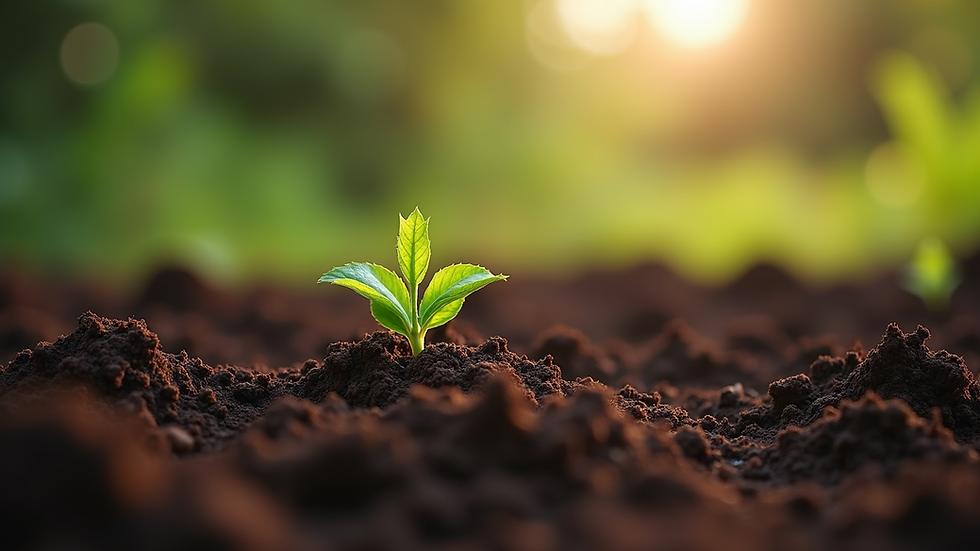Boost Your Garden with Organic Fertilizer
- Jonathan Valencia

- Oct 15
- 4 min read

If you’re like me, you want your garden to thrive without relying on harsh chemicals. There’s something special about growing plants the natural way. Using natural plant nutrients not only helps your garden flourish but also keeps the environment happy.
Over the years, I’ve learned that feeding your plants with the right nutrients can make all the difference. Let me share some tips and insights that have worked wonders in my garden.
Why Natural Plant Nutrients Matter
Plants need nutrients to grow strong and healthy. But not all nutrients are created equal. Natural plant nutrients come from organic sources like compost, manure, and plant-based materials. These nutrients release slowly, feeding your plants steadily over time. This slow release means your plants get what they need without the risk of burning their roots.
Using natural plant nutrients also improves soil health. Healthy soil is full of life - microbes, worms, and fungi that work together to keep plants happy.
When you add natural nutrients, you’re feeding this soil community, which in turn supports your plants. Plus, it’s better for the planet. No synthetic chemicals leaching into the ground or water supply.
Here’s what I’ve noticed when switching to natural plant nutrients:
Stronger plant growth with vibrant leaves and flowers
Better resistance to pests and diseases
Improved soil texture and moisture retention
A more sustainable garden that supports wildlife

Rich compost soil ready for planting
How to Choose the Best Natural Plant Nutrients
Choosing the right natural plant nutrients can feel overwhelming at first. There are so many options out there! But don’t worry, I’ve broken it down into simple steps to help you pick what’s best for your garden.
Know your soil - Start with a soil test. This tells you what nutrients your soil lacks and what it already has plenty of. You can get a kit from your local garden center or send a sample to a lab.
Pick nutrient-rich amendments - Look for compost, well-rotted manure, bone meal, kelp meal, or worm castings. These are packed with essential nutrients like nitrogen, phosphorus, and potassium.
Consider your plants’ needs - Leafy greens love nitrogen, while flowering plants need more phosphorus. Tailor your nutrient mix to what you’re growing.
Use balanced products - Sometimes, a balanced mix like organic fertilizer can simplify feeding. These products combine multiple nutrients in one easy-to-use formula.
Go slow and steady - Natural nutrients release slowly, so don’t overdo it. Follow package instructions or add small amounts regularly.

Garden bed with compost and natural fertilizers
What is organic fertilizer and examples?
Organic fertilizer is made from natural materials that come from plants, animals, or minerals. Unlike synthetic fertilizers, these are not chemically processed. They feed the soil and plants in a gentle, sustainable way.
Some common examples include:
Compost: Decomposed organic matter like kitchen scraps and garden waste. It’s a nutrient powerhouse and improves soil structure.
Manure: Animal waste that’s been aged or composted. It’s rich in nitrogen and other nutrients.
Bone meal: Ground animal bones, high in phosphorus, great for root development and flowering.
Kelp meal: Dried seaweed packed with trace minerals and growth hormones.
Worm castings: Worm poop that’s full of beneficial microbes and nutrients.
Using these examples in your garden helps build healthy soil and strong plants. You can mix them into your soil before planting or use them as a top dressing during the growing season.
Tips for Applying Natural Plant Nutrients Effectively
Applying natural plant nutrients correctly is key to getting the best results. Here are some tips I’ve picked up along the way:
Mix into soil before planting: Work compost or manure into the top 6-8 inches of soil. This gives roots easy access to nutrients.
Top dress established plants: Sprinkle nutrients around the base of plants and gently water in. This feeds roots without disturbing them.
Use mulch to lock in nutrients: Mulching with organic materials like straw or leaves helps keep nutrients in the soil and retains moisture.
Water wisely: Water after applying nutrients to help them soak into the soil. Avoid overwatering, which can wash nutrients away.
Rotate crops and amend soil regularly: Different plants use different nutrients. Rotating crops and adding fresh organic matter keeps soil balanced.
Remember, patience is important. Natural nutrients work gradually, so you might not see instant results. But over time, your garden will thank you with lush growth and bountiful harvests.
Bringing It All Together for a Thriving Garden
Feeding your garden with natural plant nutrients is one of the best things you can do. It’s simple, eco-friendly, and effective. Whether you’re growing veggies, flowers, or herbs, these nutrients support healthy roots, strong stems, and vibrant leaves.
If you’re ready to take your garden to the next level, consider trying a high-quality organic fertilizer. It’s a convenient way to provide balanced nutrition and boost your plants’ growth naturally.
Gardening is a journey, and every step you take towards natural growing methods helps build a healthier environment. Plus, it’s incredibly rewarding to see your plants thrive with just a little help from nature.
Happy gardening!
If you want to learn more about natural plant nutrients or need expert advice, The Greenery is a fantastic resource. We offer top-notch products and support for gardeners of all levels.
































Comments